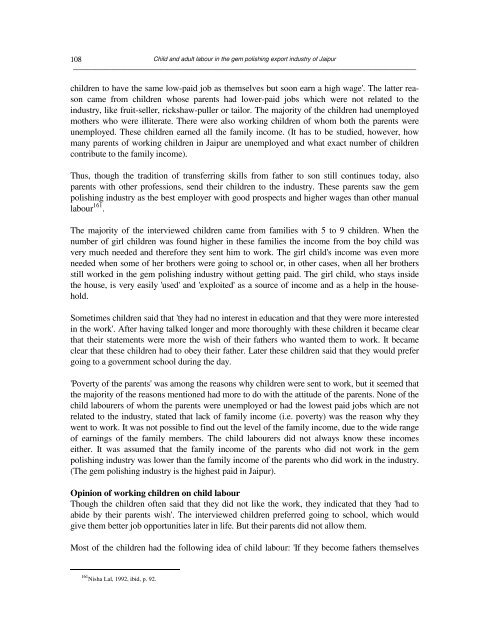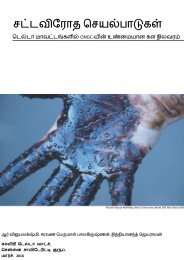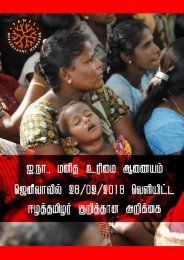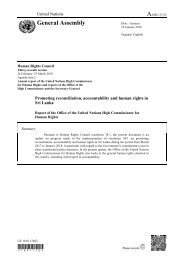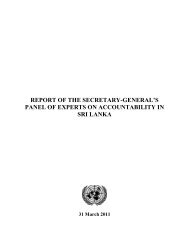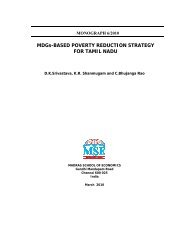You also want an ePaper? Increase the reach of your titles
YUMPU automatically turns print PDFs into web optimized ePapers that Google loves.
108<br />
<strong>Child</strong> <strong>and</strong> <strong>adult</strong> <strong>labour</strong> <strong>in</strong> <strong>the</strong> <strong>gem</strong> polish<strong>in</strong>g <strong>export</strong> <strong>in</strong>dustry <strong>of</strong> Jaipur<br />
──────────────────────────────────────────────────────────────────────────────────────────────<br />
children to have <strong>the</strong> same low-paid job as <strong>the</strong>mselves but soon earn a high wage'. The latter reason<br />
came from children whose parents had lower-paid jobs which were not related to <strong>the</strong><br />
<strong>in</strong>dustry, like fruit-seller, rickshaw-puller or tailor. The majority <strong>of</strong> <strong>the</strong> children had unemployed<br />
mo<strong>the</strong>rs who were illiterate. There were also work<strong>in</strong>g children <strong>of</strong> whom both <strong>the</strong> parents were<br />
unemployed. These children earned all <strong>the</strong> family <strong>in</strong>come. (It has to be studied, however, how<br />
many parents <strong>of</strong> work<strong>in</strong>g children <strong>in</strong> Jaipur are unemployed <strong>and</strong> what exact number <strong>of</strong> children<br />
contribute to <strong>the</strong> family <strong>in</strong>come).<br />
Thus, though <strong>the</strong> tradition <strong>of</strong> transferr<strong>in</strong>g skills from fa<strong>the</strong>r to son still cont<strong>in</strong>ues today, also<br />
parents with o<strong>the</strong>r pr<strong>of</strong>essions, send <strong>the</strong>ir children to <strong>the</strong> <strong>in</strong>dustry. These parents saw <strong>the</strong> <strong>gem</strong><br />
polish<strong>in</strong>g <strong>in</strong>dustry as <strong>the</strong> best employer with good prospects <strong>and</strong> higher wages than o<strong>the</strong>r manual<br />
<strong>labour</strong> 161 .<br />
The majority <strong>of</strong> <strong>the</strong> <strong>in</strong>terviewed children came from families with 5 to 9 children. When <strong>the</strong><br />
number <strong>of</strong> girl children was found higher <strong>in</strong> <strong>the</strong>se families <strong>the</strong> <strong>in</strong>come from <strong>the</strong> boy child was<br />
very much needed <strong>and</strong> <strong>the</strong>refore <strong>the</strong>y sent him to work. The girl child's <strong>in</strong>come was even more<br />
needed when some <strong>of</strong> her bro<strong>the</strong>rs were go<strong>in</strong>g to school or, <strong>in</strong> o<strong>the</strong>r cases, when all her bro<strong>the</strong>rs<br />
still worked <strong>in</strong> <strong>the</strong> <strong>gem</strong> polish<strong>in</strong>g <strong>in</strong>dustry without gett<strong>in</strong>g paid. The girl child, who stays <strong>in</strong>side<br />
<strong>the</strong> house, is very easily 'used' <strong>and</strong> 'exploited' as a source <strong>of</strong> <strong>in</strong>come <strong>and</strong> as a help <strong>in</strong> <strong>the</strong> household.<br />
Sometimes children said that '<strong>the</strong>y had no <strong>in</strong>terest <strong>in</strong> education <strong>and</strong> that <strong>the</strong>y were more <strong>in</strong>terested<br />
<strong>in</strong> <strong>the</strong> work'. After hav<strong>in</strong>g talked longer <strong>and</strong> more thoroughly with <strong>the</strong>se children it became clear<br />
that <strong>the</strong>ir statements were more <strong>the</strong> wish <strong>of</strong> <strong>the</strong>ir fa<strong>the</strong>rs who wanted <strong>the</strong>m to work. It became<br />
clear that <strong>the</strong>se children had to obey <strong>the</strong>ir fa<strong>the</strong>r. Later <strong>the</strong>se children said that <strong>the</strong>y would prefer<br />
go<strong>in</strong>g to a government school dur<strong>in</strong>g <strong>the</strong> day.<br />
'Poverty <strong>of</strong> <strong>the</strong> parents' was among <strong>the</strong> reasons why children were sent to work, but it seemed that<br />
<strong>the</strong> majority <strong>of</strong> <strong>the</strong> reasons mentioned had more to do with <strong>the</strong> attitude <strong>of</strong> <strong>the</strong> parents. None <strong>of</strong> <strong>the</strong><br />
child <strong>labour</strong>ers <strong>of</strong> whom <strong>the</strong> parents were unemployed or had <strong>the</strong> lowest paid jobs which are not<br />
related to <strong>the</strong> <strong>in</strong>dustry, stated that lack <strong>of</strong> family <strong>in</strong>come (i.e. poverty) was <strong>the</strong> reason why <strong>the</strong>y<br />
went to work. It was not possible to f<strong>in</strong>d out <strong>the</strong> level <strong>of</strong> <strong>the</strong> family <strong>in</strong>come, due to <strong>the</strong> wide range<br />
<strong>of</strong> earn<strong>in</strong>gs <strong>of</strong> <strong>the</strong> family members. The child <strong>labour</strong>ers did not always know <strong>the</strong>se <strong>in</strong>comes<br />
ei<strong>the</strong>r. It was assumed that <strong>the</strong> family <strong>in</strong>come <strong>of</strong> <strong>the</strong> parents who did not work <strong>in</strong> <strong>the</strong> <strong>gem</strong><br />
polish<strong>in</strong>g <strong>in</strong>dustry was lower than <strong>the</strong> family <strong>in</strong>come <strong>of</strong> <strong>the</strong> parents who did work <strong>in</strong> <strong>the</strong> <strong>in</strong>dustry.<br />
(The <strong>gem</strong> polish<strong>in</strong>g <strong>in</strong>dustry is <strong>the</strong> highest paid <strong>in</strong> Jaipur).<br />
Op<strong>in</strong>ion <strong>of</strong> work<strong>in</strong>g children on child <strong>labour</strong><br />
Though <strong>the</strong> children <strong>of</strong>ten said that <strong>the</strong>y did not like <strong>the</strong> work, <strong>the</strong>y <strong>in</strong>dicated that <strong>the</strong>y 'had to<br />
abide by <strong>the</strong>ir parents wish'. The <strong>in</strong>terviewed children preferred go<strong>in</strong>g to school, which would<br />
give <strong>the</strong>m better job opportunities later <strong>in</strong> life. But <strong>the</strong>ir parents did not allow <strong>the</strong>m.<br />
Most <strong>of</strong> <strong>the</strong> children had <strong>the</strong> follow<strong>in</strong>g idea <strong>of</strong> child <strong>labour</strong>: 'If <strong>the</strong>y become fa<strong>the</strong>rs <strong>the</strong>mselves<br />
161 Nisha Lal, 1992, ibid, p. 92.


